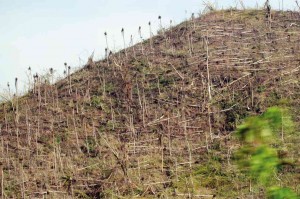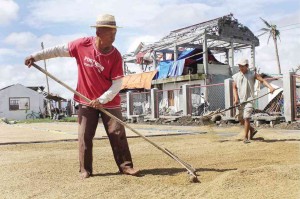It has been more than 40 days since Supertyphoon “Yolanda,” the strongest ever to make landfall, tore through central Philippines and left behind grim pictures of death and destruction not seen in recent memory.
The official death toll has been pegged at close to 7,000 and the total cost to the economy was estimated at almost P600 billion by the National Economic and Development Authority.
Then there are the thousands of farmers and fisherfolk left homeless or without a steady source of income following the massive devastation to the agriculture sector, on which most of the people in the Visayas depend.
Against such a gloomy backdrop, it is hard for the people of central Philippines, especially Leyte province that bore the brunt of the impact of the supertyphoon, to find any reason to celebrate the holidays or look forward to 2014 with a glimmer of hope.
Fortunately, international aid agencies, nongovernment organizations, as well as local and international corporations, recognize that their much-needed help will have to go beyond relief.
They know that they have to invest time and resources in the rehabilitation of damaged homes and buildings, as well as provision of livelihood, for the farmers and fisherfolk to have any chance of getting firmly back on their feet.
Among the many groups and companies that are investing big in rehabilitation are the Junior Chamber International (JCI) Philippines and fertilizer producer and distributor Universal Harvester Inc.
JCI Philippines and UHI have joined forces yet again to implement “Back to Farm,” a program to provide livelihood to the displaced food producers in central Philippines under the aegis of The Outstanding Farmers of the Philippines (TOFARM) Program.
“Back to Farm” seeks to:
Adopt and support 60 farming families for them to continue their activities in the coming cropping season;
Provide farm inputs directly to at least 100 farmer-families in target areas;
Help farmers earn sufficient income to enable them to proceed to the next cropping season.
Prospective donors can choose from a menu of assistance packages that will greatly benefit the affected households.
A donation of P5,000, for example, is already enough to buy rice or corn seeds for a one-hectare farm. The amount can also buy five native chickens for farmer-families to start a small
poultry. About P10,000, on the other hand, can buy seeds of high value crops such as petchay, carrots and potatoes, while P15,000 can cover fertilizer inputs for a one-hectare property.
Individuals and institutions with more money to spare can choose to donate P20,000, which is enough to buy a male carabao; P30,000 for a female carabao; P45,000 for a multipurpose engine with tractor and trailer; P50,000 for a 20-foot motorized bangka, and a high of P100,000 for a 20-square-meter house.
UHI executive vice president Milagros Ong-How jump-started the “Back to Farm” program by adopting the family of Tacloban-based Eleuterio Indic, who was one of this year’s TOFARM awardees.
Ong-How tells BusinessMonday that, as she prepares to celebrate her 60th birthday next year, she is even more motivated and inspired to help the farmers, who are also serviced by her fertilizer business.
“Maybe I am getting sentimental,” says Ong-How. “But honestly, I just want to set a milestone and celebrate with meaning. I want to make a big change and dedicate the rest of my life to helping farmers.”
Ong-How, named Woman Entrepreneur of the Year in 2013, is so serious in this endeavor that she has even gone back to school, taking up her first 12 units this semester on her way to hopefully securing a degree in Agronomy from UP Los Baños to add to her degree in Biology from the University of the Philippines.
Ong-How says that she is having the time of her life in school, especially as she gets to continue her education with her son, Billy, thus fulfilling her long-time wish to go to school with at least one of her children.
Earlier, she achieved another wish when she was conferred an honorary doctorate by the Angeles University Foundation.
“I am really enjoying my studies so much. I attend school because I want to know more so that I can better help the farmers. There should be no end to learning, especially if it means
She says that 2014 will be “challenging” for both her business and advocacies. Nevertheless, she looks forward with cautious optimism.
“With God’s help, nothing is impossible and any problem can be solved,” she says. “I believe there is always a better way. What I want is to make a huge impact and be effective. And my reward is seeing the farmers successful, earning more income, becoming self-sufficient and yielding more produce. That is my dream.”




